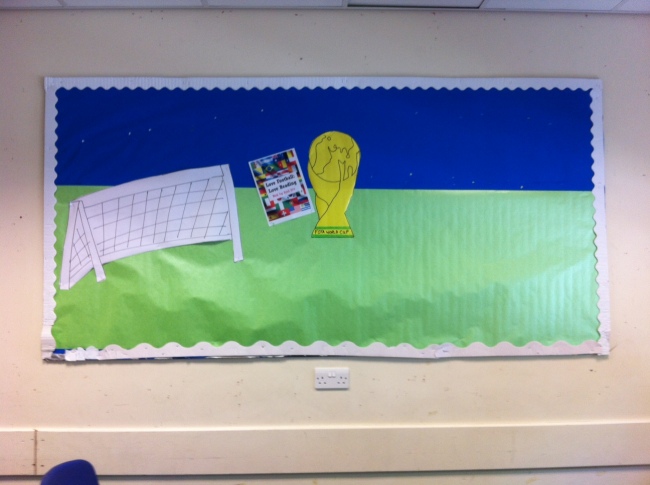It’s fair-and accurate- to say that many of the ideas I post on here aren’t necessarily suitable for your average English class of 33 students of whom some are male and some are female. Sorry but it’s the truth.
So, I’ve decided I’m going to run a World Cup Literacy Club during the 6 weeks prior, during and after the World Cup in Brazil this June. (15 days to go.) This club, I decided, was to be by invite only and will be aimed at improving the reading attitudes of a number of that most obstreperous of creatures: Boys. In fact, I thought, why not really let yourself in for something? Year 9 boys.
And so, with nothing but a rabid desire to impress, I ventured onto the Year 9 playground last week and found the boys I was looking for. I’m not going to go into too much detail about the boys and the type of students they are, or are perceived to be, for obvious reasons but let’s just say that each of the boys I spoke to wanted to come to my club so they can, and I quote, “show everyone what they can do when they have a go.” As if that wasn’t enough to put a mile-wide grin on my face, the boys asked that the club be held on a Monday, “so they have something to look forward to.”
So, here’s what’s going to happen, as I see it, on Monday 9th June, 3 days before the World Cup kicks off.
1.10pm
Welcome the boys in, ask them to sign the team sheet and get them to fill out a quick survey on attitudes towards reading. I’ll use this later to see if I’ve had any positive impact on the boys’ approach to reading; 6 weeks is, in my opinion, to short a time frame to measure a change in attainment but an improvement in attitudes towards reading would have huge implications: all research suggests improved attitudes to reading result in improved attainment in reading and writing over time.
1.20pm
Paper Talk. I’m going to give each of the boys (there’s ten of them by the way) a present: a copy of The Sun newspaper minus the third page.
(Just a thought – could I say at this point: “Any of you boys Liverpool supporters?” as I hold the copies of The Sun hesitantly in my hands. “No? Okay just thought I’d check because of the whole Hillsborough thing…” This could then lead onto a discussion of the tragedy and an exploration of the poem, The Ballad of Hillsborough at a later date…Just a thought.)
Anyways, I’m going to give each of the boys a copy of the paper and ask them to read any article(s) they so wish from the Sports section so long as it is football related. What I will also ask them to do is to highlight anything that is a ‘Nailed It’ or a ‘Head’s Gone.’
Nailed It: an opinion from a journalist or the actions of an individual player/manager/agent that the student thinks is absolutely brilliant. For example, a journalist writes that Mauricio Pocchetino needs to work on improving Roberto Soldado’s goal tally – Nailed It!
Head’s Gone: an opinion from a journalist or the actions of an individual player/manager/agent that the student thinks is absolutely barmy. For example, the student reads that Yaya Toure is threatening to leave Manchester City because the club officials didn’t buy him a birthday cake – Head’s Gone!
1.35pm
After a discussion of the Paper Talk I’m then going to show students a number of phrases:
It’s lashing with rain and thunderstorms are rumbling in the distance.
Hacked down
Dangerous Position
Stirring counterattack
Charged upfield
Ferocious counterattack
Slicing them open
Tearing them apart with every attack
…trudge forward in the rain…
I’ll ask the boys what they make of the phrases and hopefully we’ll get onto the fact that the phrases use imagery you’d commonly associate with war. I’ll then explain to the boys that phrases come from Sean Ingle’s report of the Spain vs Russia World Cup Qualifier from the Guardian website. I’ll ask the boys why they think football journalists would choose to use such imagery and maybe we’ll do a bit on metaphors and similes.
And that’s it.

